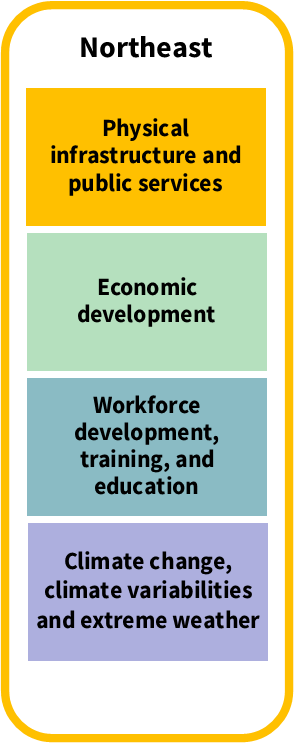National Report Released on Workforce and Economic Challenges and Opportunities Facing Rural Places
With support from UNH Cooperative Extension, as well as other Extension organizations around the country, the nation’s four Regional Rural Development Centers (RRDCs) recently released a report identifying the critical investments needed to build community capacity and improve the quality of life in rural America. The purpose of the four USDA-funded Regional Rural Development Centers is to link the research and educational outreach capacity of the nation's public universities with communities, local decision-makers, entrepreneurs, families, and farmers and ranchers to help address a wide range of development issues.

Input for generating the report came from a diversity of stakeholders, including Land-Grant Universities, nonprofit organizations, businesses, and government agencies. The report compiles recommendations and feedback collected from a stakeholder survey and listening sessions, as well as other sources. The goal is to guide rural development investments and provide a baseline for ongoing and future rural development initiatives. Key topics addressed in the report include physical infrastructure and public services; workforce development, training, and education; economic development; community vibrancy; community health; agriculture and food systems; diversity, equity, and inclusion; and climate change.
While the priorities for each of the four Regional Rural Development Centers—Northeast, Southern, Central, and Western—varied to some degree, all identified key challenges around physical infrastructure and public services, a need for workforce development training and resources, and impacts of climate change.
The hope is that the report will stimulate cross-sector collaboration between educational institutions, government, the nonprofit sector, and industry to address critical issues and leverage our collective resources to scale up our impact.
Specific challenges identified in the Northeast region included:
- Lack of affordable housing, healthcare, and financial services
- Lack of resources for small businesses and entrepreneurs
- Lack of access to broadband and other digital technologies
- An aging population and loss of younger generations by rural communities
Already, regional and national efforts are underway to address the issues addressed in the report. The goal of UNH Cooperative Extension is to help bring education and resources to bear on the challenges and opportunities identified in the report, which can be used by practitioners, decision-makers, and government agencies to inform where programmatic efforts and resources may be most effective in tackling key issues facing rural communities. Get the executive summary, full report, or topical and regional reports here.

